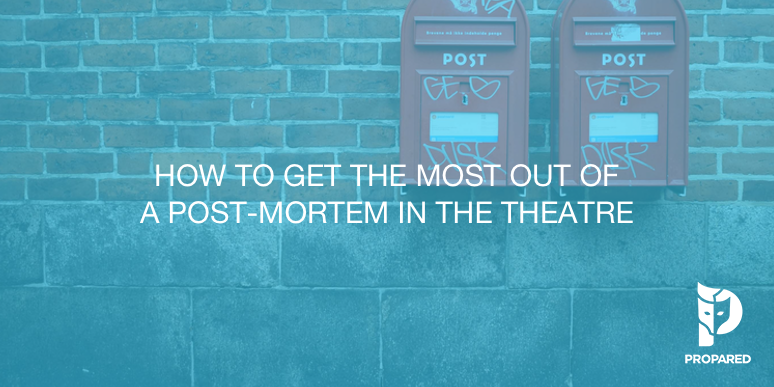
What’s the purpose of a post mortem? One often-cited reason is to discuss with your team what went well and what didn’t so we can have a better process next time.
However, that assumes we’ll be working with the same team the next time around. In theatre that just isn’t the reality. We often do not work with the same people, with the same company, or in the same venue on the next show. This makes it hard to develop any type of cohesive process from one show to the next.
So, why have a post mortem if the process is never the same? How can we leave a post mortem with useful information, without feeling like we’ve all just wasted a potential day off?
Here are a few areas you can focus on to get more from a post mortem.
Focus on Yourself
I know, this seems selfish, but if so much is changing from show to show, sometimes the best you can do is improve your own process. In a post mortem, try looking at your own personal performance in addition to other elements. Establish things that you can try differently next time even if it’s in a totally new situation.
Perspective Shift
Everyone’s been rubbed the wrong way by a colleague in the course of putting up a show. In the moment there’s rarely an opportunity to understand the situation from the perspective of others.
A great use of the post mortem is to go back and try to understand why a decision was made. Try perspective shifting by asking questions such as, “What was going on for you during this moment.” or “Can you explain your decision making process when this happened?”.
We have an opportunity to better understand the actions of others or the priorities of specific job roles that we might have misunderstood. With these types of discussions, remember to keep things factual and remove emotion which will set you up well for some good solid closure. Giving feedback the right way is important.
Hear From Everyone
Theatrical productions require the work of many people. Some people rarely have the opportunity to comment on the working environment, process, or experiences they have had working. This could include crew members, vendors, cast, etc. Think about inviting people to a post mortem that wouldn’t typically have a voice in the feedback process. Ask them their opinion on the topics under discussion. You might encounter a whole different perspective that you hadn’t thought about (See: Perspective Shifting) and find ways to improve job satisfaction for everyone.
Identify Actionable Takeaways
It’s not just about identifying what worked or didn’t work. In order for a post mortem to truly be successful, you MUST identify actionable things to change for next time and follow through on implementing those changes. This is the hardest part of all because it requires effort on your part after the meeting is over. If you don’t do it though, the entire meeting will have been a waste.
And yes, you can also do this without any consensus in the room. Follow through on the things you learn by coming up with ways to evolve your craft.
Shorten Your Meetings
We often schedule one big post mortem. This creates long, tedious meetings where, towards the end, you wish it were just over.
But you don’t have to review every single process and interaction on every show. Try picking a specific topic for discussion. You can ping people ahead of time for ideas if you want. The topic can be something that was new or challenging brought on by the subject matter of the show, or a specific technical/design element. With targeted topics and a curated group of people you can actually have a post mortem that lasts 45 minutes! After all, you’re going to be doing one of these after every show, right? Right?!?!? 🙂
You could also schedule smaller meetings between groups of people that interacted a lot through the production – making the substance of each meeting more relevant for each person.
Share Your Findings
Don’t underestimate the usefulness of the post mortem. Others may find it useful as well. Write up a summary of the topic, the discussion points, and the actionable steps for the future. This will also help with accountability for when you put these ideas into practice.
At the end of the day, if you didn’t find your last post mortem useful, keep trying. Feedback is an important part of growth. It also allows others to learn from your experiences so they can do their jobs better down the road. If we’re able to stop for even a little while and reflect, we can put some of what we learned into practice for the future.
Click here to see original post

